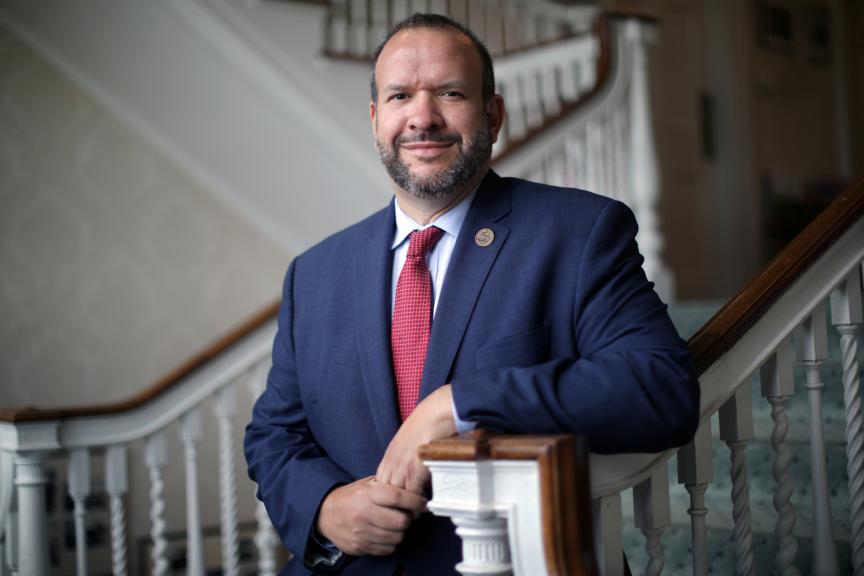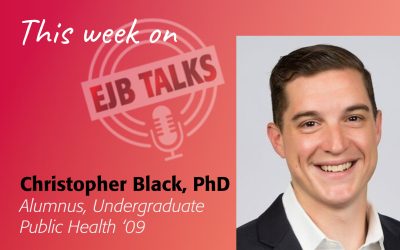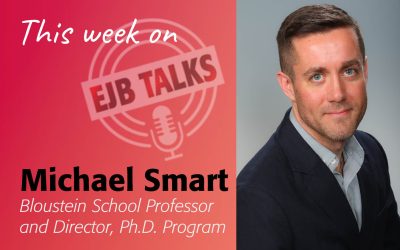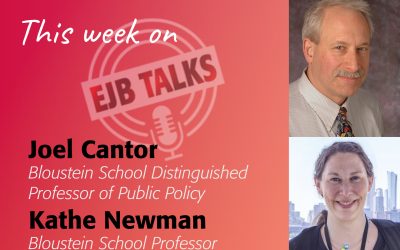Stuart Shapiro welcomes New Jersey Department of Labor Commissioner — and Bloustein policy alumnus — Robert Asaro-Angelo to EJBTalks this week. Commissioner Asaro-Angelo talks about his start with ESPN, and how he was inspired to change his path because he wanted to work helping people. He also discusses his time working with labor unions and his tenure in the Obama administration. They then move the discussion to NJDOL’s response to the COVID pandemic — how the agency had to quickly protect its employees, find the equipment to help them work remotely, and implement complicated federal DOL programs just as the need for federal assistance exploded. The Commissioner concludes by talking about how the pandemic crisis, which brought a sense of urgency in getting things done in government, has the potential to make a positive lasting change by increasing people’s faith in a stronger, more competent government.
Stuart Shapiro
Welcome to EJB Talks. I’m Stuart Shapiro, the Associate Dean of Faculty at the Bloustein School, and the purpose of this podcast is to highlight the work my colleagues and alumni in the fields of policy, planning, and health are doing to make the world, the country, and New Jersey a better place. Today we’re honored to be speaking with the New Jersey Commissioner of the Department of Labor, Robert Asaro-Angelo, an alumnus of the predecessor to the Bloustein School’s Public Policy Program. Welcome to the podcast, Rob.
Robert Asaro-Angelo
Stuart, thanks for having me. Look forward to talking.
Stuart Shapiro
Rob, tell us a little about the path your career took that led you to be Labor Commissioner.
Robert Asaro-Angelo
It’s a bit of a weird path. I started actually, I wanted to be a sports broadcaster. And out of my undergrad….
Stuart Shapiro
I wanted to be general manager of the Yankees ((laughing))
Robert Asaro-Angelo
((laughing)) … I wanted to be a sportscaster because I didn’t make the JV baseball team when I was a sophomore in high school. But I went to actually undergrad for Communications at Boston University. And I was, I think for my age, pretty successful. I was working at ESPN during the summers and during school. I worked on the ’96 Olympics in Atlanta for NBC. I worked on the first 7 X-games. And then I was home for a while between X Games, actually. And I was waiting for the next remote gig, and I went and volunteered on the McGreevy for Governor Campaign in 1997. And I went to work… I got a job. And, my parents were involved in politics.
And I really fell in love with the excitement of the campaign, with working for something bigger, and working on someone’s going to help people and where they are in their lives. Obviously, we did not win. But at that point, I knew that broadcasting…. well, as much as I loved it and it was exciting, I just felt like in the end, especially when Disney bought ESPN, I felt like I was doing all this work and working crazy hours for very low wages, for not anything bigger than myself or anything that was helping anybody, quite frankly.
But I knew that if I want to do something big in government and politics that I had to get an education in that. And that’s when I came to Rutgers and came for the one-year master’s program offered, at that time through Bloustein and the Eagleton Institute of Politics. Then after that a bunch of work for different unions around the country, which led to going to Washington, New York, back home in Jersey for the Democratic Party in New Jersey, and then went to work for the Obama Administration in the federal U.S. Department of Labor during a somewhat crazy time. I started not long before Sandy hit, and I was there for the end of the Obama administration. I worked in the federal DOL, which is very analogous to the state DOL. Most state departments of labor have the same missions and the same department, quite frankly, that is funded by the USDOL. So it was a good fit here.
Stuart Shapiro
That’s, that’s excellent. So part of this podcast is to learn from you, but also I want to pump up Bloustein a little bit. Can you tell us a little bit about how you’ve used your policy degree throughout your career and in your current position?
Robert Asaro-Angelo
I use it every day, to be honest. And also in my hiring, I always try to hire folks who’ve gone to Bloustein. And not just because I’m a Rutgers fan, and an alum, but because I know the training and education received there really shows how government works. And just a quick story when I was there. There was a class, I think it was Governor Florio’s first class actually at Bloustein. I think it was called energy policy or something like that. And it was really–all due respect to the Governor–it was really the Governor telling great stories about being Governor, and how the sausage got made. And I think I learned more in that class than anything else. But it was great to hear from somebody who was a great politician, but also a very effective government leader. And to hear how you can get stuff done in government while being mindful of politics and being successful in politics because you can’t have one without the other. And that’s where I think some folks focus too much on policy. Some folks focus only on politics, with no shining light of policy.
That’s why I think Bloustein does a great job of combining the two, especially when they work closely with Eagleton, no doubt, because I think that that was the important lesson I took. That you can be a good politician and enjoy politics with the end goal of having good policy. And whether it be data-driven policy decisions, being able to use survey models and research to inform those decisions, it’s something that I try to bring to the Department of Labor for sure. And when I feel like when you’re in the government, it’s not as common as I would like, to be sure, I think it’s increased under this administration. But when I feel like you find other colleagues in government who have the same kind of approach, that where you can be successful together again, I think that starts at Bloustein. Working with your teammates, on projects. Well, maybe I’m dating myself, being in the computer lab, where all of us could use SPSS… was in the building. ((laughing))
Stuart Shapiro
((laughing)) We still have a computer lab, we don’t use SPSS anymore.
Robert Asaro-Angelo
((laughing)) OK… Being in there talking about how to put things together. How you can get to this goal? How can you get this end result and what are the methods to get there that are proper? I think guides what we do in government.
Stuart Shapiro
Yeah, I’ve spent my life thinking…. or my research life thinking, about that politics-policy interface. And certainly, it’s something I talk a lot about with students. So it’s great to hear you talk about the real-world applications of that. In terms of the real-world applications…
Robert Asaro-Angelo
I think that I’m an anomaly a little bit government because so many folks are so hyper-focused on the politics of everything they’re doing. And I think that leads to bad results a lot of times, which is not why I am here … this is not a campaign event. But I do enjoy working for my boss, Governor Murphy because I think he really tries to make decisions based on the better policy, based on data and results. And while certainly, everyone who’s a governor is a political animal, to some degree, I think he’s done a very good job of keeping that separate from the policymaking that’s going on in this administration.
Stuart Shapiro
Yeah. And social media, and the 24-hour news articles, made sort of the politics-policy balance much less even than it was I think when probably you and I were growing up a little bit. And that’s unfortunate, in my view. In terms of the real-world applications of this, I am sure the job changed very dramatically for you starting in March 2020, with the onset of the COVID-19 pandemic. Can you talk a little bit about how the Labor Department reacted to the pandemic and perhaps more relevantly, the ensuing economic downturn?
Robert Asaro-Angelo
Well, I think everyone was affected by COVID. So the hard thing to remember that people are like, “Oh, well, how come unemployment wasn’t ready to go right away?” and “How are you not ready for this huge, vast increase?” The biggest reason was that at that time, we had to worry about our own employees and their safety. You know, all of our operations, especially for unemployment, were all done in an office, in a call center, where folks are very close together with low walls, essentially. You picture a call center, how close folks are together in that huge quarters. So the first thing we had to do is make sure that our employees are safe, which obviously took a lot of the work offline at that point in time.
And unfortunately, in New Jersey state government, there’s never been any kind of telework options for workers. So nobody, except for the managers, and maybe not even some of them had laptops, or computers available to them at home. So our first order of business, after protecting everybody, getting them out of the offices, was basically ramping up the ability for our staff to work remotely. At the same time that every single government agency in the world, every school system in the world, were also trying to get computers and technology. So while we were trying to order computers through the government contract, at the same time, me and my colleagues, management, were going to every Best Buy, we could go to. At that point in time, there was a limit of two laptops per purchase. So we spent days going to Best Buys all over the area. And it sounds crazy. But we knew that every single laptop we bought back was going to mean that some staffer can talk to a dozen people with their unemployment that day.
And that was sort of the choices we had to make. Luckily, supply chains have gotten better. But that was the craziness of the initial surge.
Stuart Shapiro
Wow, that’s something else…
Robert Asaro-Angelo
So just basically being able to be operational. So that’s going to be one of the long-term benefits of COVID is that now we are more flexible, just like schools are. You know, whether or not there will be snow days in the future, who knows. But now that we have the ability, and hopefully the policy change eventually, that workers may need to work from home in some regard. I’m not saying full-time telework. But it’s definitely one of the … You know, when I go back to my time in the Obama administration, I was talking about flexible workplaces to make things easier for families. It was something I focused on very much. I’ve not have much success in New Jersey government on that front. But certainly, sometimes things change when you don’t want them to.
Stuart Shapiro
So how about from a policy perspective, the things the Labor Department has had to do to deal with the economic conditions, which were almost unique. I mean, the very sharp drop in employment immediately with the onset of the pandemic, and then the somewhat bumpy recovery that we’ve had since then.
Robert Asaro-Angelo
Yeah, I mean, it’s actually interesting also being in the department of labor where we’re… especially on the UI side, which is 100% federal program, essentially. All of our rules for UI are governed by the feds. But that being said, states do have leeway. And in New Jersey, we have pushed the boundaries of eligibility standards for workers. We have consistently, pre-pandemic, always had the most number of workers who are unemployed eligible for unemployment. For example, in Florida, or North Carolina, it’s like 10 or 12% of workers end up being eligible. In New Jersey 57-58% is the norm, double the national average.
So our legislature has, over time, pretty much pushed the boundaries of who can be eligible, what the standards are. But after that, the eligibility determinations are hugely governed by the federal government. So that was the biggest challenge, quite frankly, was not only did we want to help workers who at that point were ineligible, but also thanks to the CARES Act, which we were thrilled about, to help more workers. But at the same time, it was basically, Congress passed a bill, the President signed it, and we had hundreds of thousands of workers in New Jersey expecting to have payments that week. And you know, these were very complicated federal programs that in normal times would take a year, if not longer, to stand up, let alone trying to program into our systems. And I noticed a lot of talk about our outdated technology, and it certainly is outdated. There’s no doubt about it. But in the end, since March 17 of last year, our systems only been down for I think, a total of 30 hours. Which is… and been able to pay out $29 billion with a B.
So most of the frustration people have usually ends up being with federal policy about unemployment eligibility, and the convoluted rules that lie within. But at the same time you talk about the policy changes because the COVID state of emergency that was signed by the governor, it gave us different contracting flexibilities. We were able to quickly hire more staff and has allowed us to bring back retirees, bring back in additional part-time workers. So a lot of the things that were complications pre-COVID, as far as governing, were sort of taken down because the public health emergency gave us more flexibility in a lot of the areas. And that helped us better serve our customers and claimants.
Stuart Shapiro
And those implementation factors are the kinds of things that affect people’s perceptions of government for the rest of their lives.
Robert Asaro-Angelo
Yup.
Stuart Shapiro
I mean, could they get that check when they were laid off? Was the government there to help them? It’s critically important in terms of whether or not they’re going to support government action, how they feel about the American rescue plan…
Robert Asaro-Angelo
Yes.
Stuart Shapiro
The American Families Plan, all of that is affected by whether or not you and your department do its job.
Robert Asaro-Angelo
Yes. And, you know, I said that in our Senate Budget testimony a couple of weeks ago that, you know, we haven’t implemented ONE unemployment system this past year and a half, we implemented 22 different ones. We did that…so many times there were changes in federal law, or guidance from the U.S. Department of Labor, or FEMA. And it’s just, I’m so proud of our staff to be able to get through this. Quite frankly, mostly on their own, we’ve had very little use of outside consultants, other than for customer service for the call center. But I just… I’m thrilled. I think that, you know, nobody wants a crisis in government ever. But they are great learning experiences. And I know that our staff is going to be stronger and better government servants going forward because of this.
Stuart Shapiro
How did your experience in previous crises like Sandy inform your work over the past year?
Robert Asaro-Angelo
I think it was very helpful to say at least. You know, when Sandy hit I was with the U.S. Department of Labor, and I went on assignment to FEMA for about three or four months during Sandy working in New Jersey, helping the folks from FEMA navigate the New Jersey government and politics, quite frankly. It was really amazing thinking back to then when, after Sandy hit, within two weeks there were about 3000 people on the ground from FEMA, here to help us just in New Jersey. If you are talking about New York, we’re talking almost 10,000. So I was just so honored to work with these folks who had given up their time to come help us in our time of need, and seeing how that whole structure comes together. And it’s a very militaristic operation. I mean that in a positive way, how organized it is. But seeing how all the different government agencies are working together. It’s not just FEMA, part of their operations when there’s a disaster is, folks from SBA, folks from HUD, folks from labor like me, every government agency is there that has anything to do to help people.
But at the same time, when I would go out there, whether it be town halls folks are hosting and whether it be Sayerville or down in Mantoloking, about folks whose homes were destroyed, and the different programs were able to help them. It was not easy to understand. It was super, super complicated. It’s not surprising that government is complicated. When you’re in a disaster situation, and you have to wade through four different departments and all the different rules and regs and being told you’re eligible for this, but not for that, it’s soul-crushing sometimes. So that experience certainly has guided us this past 14 months because at every turn when we could have control over, we couldn’t have control necessarily over who’s eligible, or what federal programs that were, or ability to train up to 1000 new staff right away, that’s impossible. But we did have control over how we communicated.
And unemployment is an extremely complicated federal program. And even when we do our best, it’s still very difficult. But I think that was the biggest thing I took from that experience. Being able to try as much as possible to clearly communicate about what programs you’re eligible for. We built an eligibility tool on our website for folks to go on first, before they apply, to figure out are they eligible for family leave? Are they eligible for sick leave? Are they eligible for unemployment? So I think that while it’s never 100%, because our programs are complicated, that’s been the biggest experience that I used in this past 14 months was being able to hopefully make it easier and reduce the stress and anxiety folks who are going in and using these programs.
Stuart Shapiro
I always like to end with sort of looking forward. What are the lessons from the past year that everyone says everything’s different after COVID, and going back to normal is not going to be normal and all of these sorts of pithy sayings? But what do you think are sort of the implications, particularly for your agency in your area of policy, as we look forward, moving out of this year, unlike any other we’ve seen before?
Robert Asaro-Angelo
I mean, specific to labor policy. I think, again, as I talked about, us pushing the boundaries in New Jersey for eligibility, obviously. I think we’re one of the most worker-friendly states in the country. I think that we’re, you know… Oxfam International said that us and Washington state are the two best states to be in during COVID as a worker. And we’re very proud of that designation. But as far policy-wise and how government operates, I think that we’re going to see the level of urgency that was here during COVID, to get things done in government, whether it be through executive order, or whether it be with working with the legislature, I think it’s something that can carry forward.
And I think that people are seeing that workers, that residents, or anybody…. businesses, you know. While COVID has bought a mass of folks in dire situations, people were in dire situations pre-COVID, for many different reasons. And our ability for government to respond to those dire situations wasn’t always efficient. So I do think that the forced collaborations that have come about because of COVID, between government agencies, state and federal, and local, I think will be something that lives on. But I think there’s a sense of urgency now, to serve our residents, and that government is here to help them and not here, you know, as some kind of negative. That we’re here… that how important government is in their lives. I think this invigorated, myself and other government workers, to show that the work we do every day is so important to people and will hopefully make things smoother and more efficient in government and hopefully help people in government push boundaries. Whereas in the past, they might say, “Oh, well, let’s wait and see if some other state does it or not, or let’s see what the so and so says.” I think there is a sense of urgency about getting things done quickly, to affect people’s lives. I think hopefully will stay past COVID.
Stuart Shapiro
Well, after coming out of an era in which there was deep skepticism about government, I really hope you’re right about that, because getting people back on board with the idea that government can help. Government can screw up too, but that government can help would be really important. Is there anything else you’d like to share before we sign off?
Robert Asaro-Angelo
No, I’m good, I feel like I’ve said a lot. I just want to encourage folks that I’m a huge fan of Bloustein, obviously, and we just talked about the faith in what governments do, I think was something that was instilled in us as students there. Doesn’t matter what party you’re from, that if you have a belief that government should be operating better, or operating broader or quicker or more efficient, then the lessons you’re going to learn at Bloustein will and can help you be somebody who’s taking a role in that going forward.
Stuart Shapiro
Well, that’s a great note to end on. Thanks so much for coming on.
Robert Asaro-Angelo
Thanks, Stuart, have a good day. Have a great weekend.
Stuart Shapiro
A big thank you to Commissioner Asaro-Angelo and to our production team, Amy Cobb and Karyn Olsen. We’ll probably be going bi-weekly for the summer. So we’ll see you in two weeks with another talk from another expert from the Bloustein School. Until then, stay safe.




